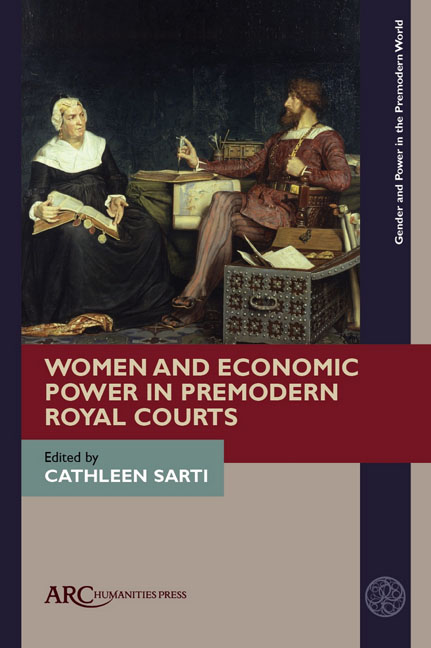Book contents
- Frontmatter
- Contents
- Acknowledgements
- Introduction: Women and Economic Power in Premodern Royal Courts
- 1 The Medieval English Queen as Landholder: Some Reflections on Sources and Methodology
- 2 Financial Power of Empresses and Princess Consorts of the Holy Roman Empire
- 3 “Edward III’s Gold-Digging Mistress”: Alice Perrers, Gender, and Financial Power at the English Royal Court, 1360– 1377
- 4 Counselling the Danish King: Sigbrit Villoms as Financial Mastermind for Christian II, 1513– 1523
- Afterword: “Power Is Money”? Reflections on Money, Power, Sex, and Gender in Premodern Royal Courts
- Bibliography
- Index of Persons and Topics
3 - “Edward III’s Gold-Digging Mistress”: Alice Perrers, Gender, and Financial Power at the English Royal Court, 1360– 1377
Published online by Cambridge University Press: 20 November 2020
- Frontmatter
- Contents
- Acknowledgements
- Introduction: Women and Economic Power in Premodern Royal Courts
- 1 The Medieval English Queen as Landholder: Some Reflections on Sources and Methodology
- 2 Financial Power of Empresses and Princess Consorts of the Holy Roman Empire
- 3 “Edward III’s Gold-Digging Mistress”: Alice Perrers, Gender, and Financial Power at the English Royal Court, 1360– 1377
- 4 Counselling the Danish King: Sigbrit Villoms as Financial Mastermind for Christian II, 1513– 1523
- Afterword: “Power Is Money”? Reflections on Money, Power, Sex, and Gender in Premodern Royal Courts
- Bibliography
- Index of Persons and Topics
Summary
Where woman reign or be in authoritie, there must nedes vanitie be preferred to virtue, ambition and pride to temperacie and modestie, and finallie, that avarice the mother of all mischefe must nedes devour equitie and justice.
John KnoxJohn Knox's infamous 1558 polemic The First Blast of the Trumpet against the Monstrous Regiment of Women forms part of a familiar topos that connects women— and especially female rule and political power— with the sin of avarice. Deborah Valenze has highlighted that “early modern iconography inherited a host of medieval emblems relating to avarice, which depicted figures, usually female, grasping at or scooping up coins.” Richard Newhauser has likewise identified several female depictions of avarice from the early Middle Ages, including “Delilah,” “inhuman mistress,” “misshapen woman,” “whore,” and “woman hiding money bags.” These generic images were frequently associated with powerful women by their contemporary critics. In her study of the Medici women in Renaissance Florence, Natalie Tomas has discussed how the wealthy Alfonsina Orsini, who acted as regent during the absences of her son Lorenzo de Medici, was frequently and openly condemned for her avarice and ambition. Tomas notes that Alfonsina was the only member of the Medici family to be designated with this vice, and that by way of contrast “financial success and the will to acquire wealth […] was perceived as desirable and God-given in male rulers.” Returning to early medieval Europe, “some vices,” as identified by Pauline Stafford, “are regularly attributed to queens, the most common being avarice.” This was certainly true later on of Isabeau of Bavaria, queen of France from 1385 to 1422, who was accused of avarice and moral corruption as part of the condemnation over her political aspirations.
The correlation between female power, sexual wantonness, and avarice is also a prominent theme in the life of Isabeau's near contemporary, Alice Perrers. Alice was the mistress of the chivalric hero Edward III of England during the less glorious “final” years of his reign, from approximately 1361 to his death in 1377. Mother to three of Edward's children (a son and two daughters), Alice is largely portrayed by contemporaries as an unprincipled and immoral harlot who manipulated and controlled the increasingly aging and infirm king to her advantage.
- Type
- Chapter
- Information
- Women and Economic Power in Premodern Royal Courts , pp. 59 - 72Publisher: Amsterdam University PressPrint publication year: 2020



